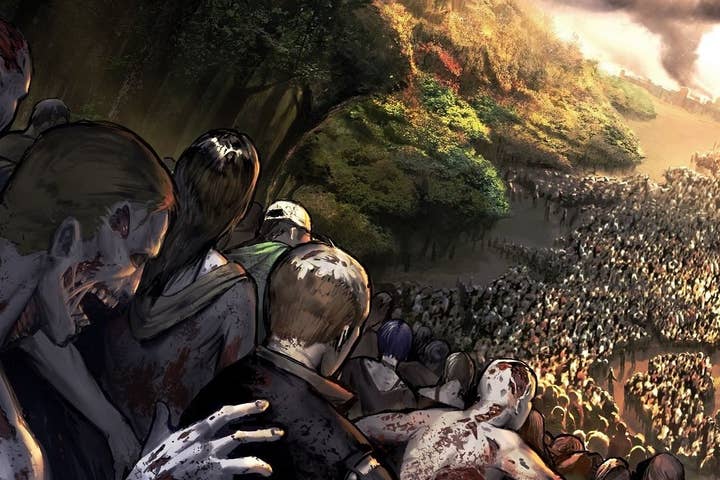Mobile barriers to entry growing exponentially - Scopely
CEO of The Walking Dead: Road to Survival publisher says it's a person-eat-person business increasingly favoring the established hitmakers
It wasn't too long ago that the mobile market was undiscovered country, a wide-open playing field where scrappy upstarts and established high rollers seemed equally likely to sink or swim as everyone was just trying to discover what gameplay and business models would work on the new devices. As Scopely CEO Walter Driver told GamesIndustry.biz, that wasn't so long ago, but it sure seems far, far away.
"I think the market is maturing pretty rapidly," Driver said. "When Apple and Google first arrived with the App Store and Google Play, really they obliterated all barriers to entry. They were providing distribution and payments on a global scale. Since then, particularly with the shift to free-to-play, the barriers to entry for new entrants have grown exponentially. And now the level of investment and infrastructure needed to build a large global free-to-play game is exponentially higher than it was 24 months ago. The stakes are getting much higher. The revenues of the top-performing games are exponentially higher.
"I think we'll see an occasional outlier new studio that does something successful and people will point to them and say it's still possible. And it will always be possible, but it will be increasingly improbable."
"It's fair to say it's very inhospitable for new entrants out to form a mobile game company today. I think you need to be raising $50 million dollars-plus to build a global publisher, just as a starting point. I think we'll see an occasional outlier new studio that does something successful and people will point to them and say it's still possible. And it will always be possible, but it will be increasingly improbable. The odds have gotten much, much longer."
Part of that shift is due to the types of games that have become popular. As the games-as-a-service model (which Scopely has put to good use with hits like Yahtzee with Buddies and the recently released chart-topper The Walking Dead: Road to Survival) has grown more popular, it also demands an increasingly sophisticated approach in every respect.
"It's starting to become a much more competitive market that is going to favor incumbents with large distribution networks, world-class performance marketing structure, large amounts of capital, access to big brands, ability to create really high monetizing products supported with massive marketing spend... all of those things are happening," Driver said, adding, "You need to localize in 15 languages. You need to be able to distribute in China on Android devices. You need to be able to run servers on a global scale. You need to be able to spend $1 million per day, effectively, through performance marketing and know what the return on investment is across 20,000 different advertising campaigns running for a single product. That's what the leaders in the market are doing, and it requires a level of organizational sophistication that was not necessary two or three years ago."

Granted, as the head of a mobile gaming publisher that assists developers with the less-than-glamorous but no-less-crucial work of analytics, biz dev, live ops, quality assurance and so on, Driver benefits from a market where those barriers to entry exist for small developers. And in recent years, Scopely has indeed thrived. In August, Inc. magazine ranked Scopely ninth on its list of the fastest-growing private companies in the US, having grown 19,560 percent from 2011 to 2014. This year has been no slouch either, as Driver said the company's on pace to triple revenues year-over-year, thanks to the launches of Yahtzee with Buddies and The Walking Dead.
"[C]onsumers looking for new stuff will have no shortage of games to play, but the top grossing charts are not going to be where you find the newest titles to discover and entertain yourself with."
Driver was particularly proud of having two launches in the past six months that both cracked the top 50 in the highest grossing charts, especially considering how little churn there can be among the top ranks, where games like Clash of Clans, Game of War: Fire Age, and Candy Crush Saga seem to be permanently entrenched. While he'd probably prefer to see Scopely's games in that upper echelon, Driver doesn't think the seeming calcification at the height of the top-grossing charts says anything too negative about the health of the free-to-play market.
"It's a reflection of the maturation of the marketplace and the shift toward live games as a service," Driver said. "I think what you're seeing is large incumbents that have significant DAU bases in games that are very deep and monetized to a high level over a long period of time. People are just investing more and staying with the products they care about and that's what keeping those games at the top of the charts.
"I think it's actually encouraging that you can build a business that lasts for years and years around an individual title. I think it's an indication that the businesses that have scale already are very healthy and very durable. I think it's an indication also that it's going to be difficult to supplant those games. There's going to be slower and slower turnover in the top five positions because those games have achieved such revenue and user scale and awareness. But there are still hundreds of games being launched every day so consumers looking for new stuff will have no shortage of games to play, but the top grossing charts are not going to be where you find the newest titles to discover and entertain yourself with."
While the chances of success on mobile for small studios and big operations may be diverging, many of the other industry trends are pushing toward convergence. He sees the emphasis many companies have placed on bringing core gaming audiences to mobile platforms in recent years as just one example of this.
"Just as the line between gamer and non-gamer has been destroyed, I think the distinction between console and mobile will become less distinct over time."
"There used to be a distinction between gamers and non-gamers," Driver explained. "It was binary. You were either someone who bought a console device, spending hundreds of dollars up front and $50 a pop to buy those games, or you were not someone who did that. I think that distinction is gone now. Everyone has the potential to be a gamer because everybody has a gaming device with them all of the time. That includes people who were traditionally gamers. They're now playing more games on their touchscreen devices, and people who were relatively casual gamers are becoming more engaged, sophisticated game players who are looking for more challenging and deep game experiences. I would say people are catering to both of those trends, with core game players starting to play games on mobile, and people who were casual gamers becoming comfortable with deeper gameplay."
The advent of touchscreens may have triggered that sort of convergence, but Driver said there's more to come on the hardware side. Products like Apple TV bringing mobile experiences to the living room can only further erode the distinctions people have about what types of games are appropriate for what type of hardware.
"Just as the line between gamer and non-gamer has been destroyed, I think the distinction between console and mobile will become less distinct over time," Driver said. "Those businesses won't be as separate as they once were."

